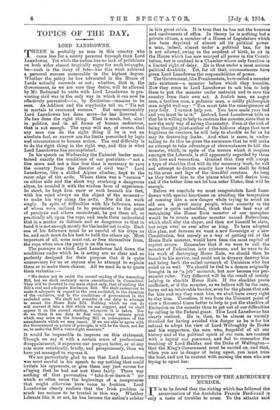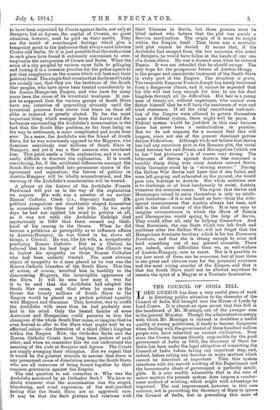THE POLITICAL EFFECTS OF THE ARCHDUKE'S
MURDER.
IT is to be feared that the rioting which has followed the assassination of the Archduke Francis Ferdinand is Liberals like it or not, he has become the nation's arbiter only a taste of troubles to come. To the attacks said
to have been organized by Croats against Serbs, not only at Serajevo, but at Agmm, the capital of Croatia, no great attention, however, need be paid on their merits. They are the result of overcharged feelings which give a temporary point to the jealousies that always exist between Croats and Serbs. Or it is just possible that the authorities in each place have found it extremely convenient to over- emphasize the antagonism of Croats and Serbs. When the scum of a city peopled by various races falls to pillaging and looting it is a common practice for the police agents to put that complexion on the events which will best suit their political book. The simple fact remains that Serbs and Croats are racially one; that they are the backbone of the South Slav peoples, who have never been treated considerately in the Austro-Hungarian Empire, and who have for many years been the cause of its structural weakness. It can- not be supposed that the various groups of South Slays have any intention of quarrelling seriously until the tyrannical pressure from above that bears on them all alike is removed or greatly abated. By far the most important thing which emerges from the horror and dis- turbances surrounding the Archduke's assassination is the fact that the South Slav problem, so far from being on the way to settlement, is more complicated and acute than ever. In a sense, the Archduke was the friend of South Slays, for he was notoriously opposed to the Magyars, who domineer mercilessly over millions of South Slays in Hungary, and yet it was a Slav assassin who murdered him. This point needs a little explanation, and it is not really difficult to discover the explanation. It is worth considering, for, if the accidental differences amongst the South Slays are magnified into permanent causes of dis- agreement and separation, the future of politics in Austria-Hungary will be wholly misunderstood, and the warning of the Archduke's assassination will be wasted.
A glance at the history of the Archduke Francis Ferdinand will put us in the way of the explanation we require. His wife was a member of an ancient Roman Catholic Czech (i.e., Slavonic) family. Ins political sympathies not unnaturally shaped themselves in accordance with those of his wife. In his early days he had not applied his mind to polities at all, as it was not until the Archduke Rudolph died mysteriously in 1889 that there seemed any likeli- hood of his coming to the throne. When he did become a politician so perceptibly as to influence affairs in Austria-Hungary, he was found to be, above all things, a Clerical. He was, like his wife, a scrupulously practising Roman Catholic. But as a Clerical he believed that his best hope of helping the Church was to bestow his sympathy on those Roman Catholics who had been unfairly treated. The most obvious object of sympathy to a man placed as he was was the Roman Catholic branches of the South Slays. This line of action, of course, involved him in hostility to the domineering Magyars, the incorrigible oppressors of the Slays. It will be seen how easy it was for it to be said that the Archduke had adopted the South Slav cause, and that when be came to the throne the twenty millions of South Slays in the Empire would be placed on a perfect political equality with Magyars and Germans. This, however, was to credit the Archduke with more than he had probably ever bad in his mind. Only the heated fancies of some Austrians and Hungarians could perceive in him the champion of the whole South Slav cause, or imagine that he even desired to offer to the Slays what might well be an effectual solace—the formation of a third (Slav) kingdom within the Empire. Now, the Orthodox Serbs and the Roman Catholic Croats have long been jealous of each other, and when we remember this we can understand the meaning of the riots at Serajevo and Agram. The Croats are simply avenging their champion_ But we repeat that it would be the greatest mistake to assume that there is any permanent cause of dissolution among the South Slays, who are all conscious of being bound together by their common grievances against the Empire. The real question to ask ourselves is : Why was the Archduke murdered by an Orthodox Serb ? We have no doubt whatever that the assassination was the stupid, blundering, and cruel expression of the well-justified • feeling that the South Slays are an aggrieved race. . It may be that the Serb plotters had relations with their kinsmen in Servia, but those persons must be blind indeed who believe that the plot was purely a Servian machination. The origin of it must be sought within the Empire itself. That there was a carefully laid plot cannot be denied. It seems that, if the Archduke had escaped from the two assassins who acted at Serajevo, he would have fallen at the hands of any one of a dozen others. He was a doomed man when he entered Bosnia. It was not intended that he should escape. The only hope for the prosperous future of Austria-Hunga is the proper and considerate treatment of the South Slays in every part of the Empire. The situation is grave. The venerable Emperor Francis Joseph has barely recovered from a dangerous illness, and it cannot he expected that his life will last long enough for him to see his dual kingdom through all its difficulties, His heir is a young man of tweuty-six without experience, who cannot even flatter himself that he will have the assistance of wise and. tried statesmen. If all the chief constituent nationali- ties of the Empire were allowed to govern themselves under a Federal system, there might well be peace. A Federal system would be justified in this case because there has never been a centralization in practice. But we do not suppose for a moment that this will happen, since not one of the present dominant parties desires Federalism. Although we do not believe that Servia has bad any conscious part indhe Bosnian plot, the racial bond between her and Bosnia, and Herzegovina (which are to her 'lost provinces ") is of course very strong. The bitterness of Berrie against Austria has remained a terribly sharp thing ever since Austria coerced Berrie while Germany stood by in" shining armour." During the Balkan War Servia well knew that if she failed, and were left gasping and exhausted on the ground, she would pass into bondage to Austria. Her whole ambition now is to challenge, or at least handsomely to resist, Austria whenever the occasion comes. The report that Servia and Montenegro intend to unite themselves is only an intelli- gent deduction—if it is not based on fact—from the wide- spread consciousness that Austria always has been, and still is, the chief enemy of the Slays. It is very easy to imagine circumstances in which the Slays of Bosnia and Herzegovina would spring to the help of Berrie. They would, after all, only be helping themselves. And then Roumania, the one State which was left fresh and scathless after the Balkan War, will not forget that the Hungarians dominate territory which is for her Roumania Irredenta, and that she is strong enough to seize and hold something out of any general scramble. There are, indeed, more difficulties than we, as well-wishers of Austria-Hungary, care to count. Nor is it possible to say how most of them can be overcome, but at least there is one great and obvious cure for the perennial weakness and the most crying scandal of the Empire, and that is that the South Slays shall not be allowed anywhere to remain the sport of a Magyar or a Teutonic domination.



















































 Previous page
Previous page